
All Recent Reviews of
All We Imagine as Light
Reviewers on this page:
Tatsam Mukherjee
Ishita Sengupta
Keyur Seta
Renuka Vyavahare
Shubhra Gupta
Rahul Desai
Upma Singh
About All We Imagine as Light
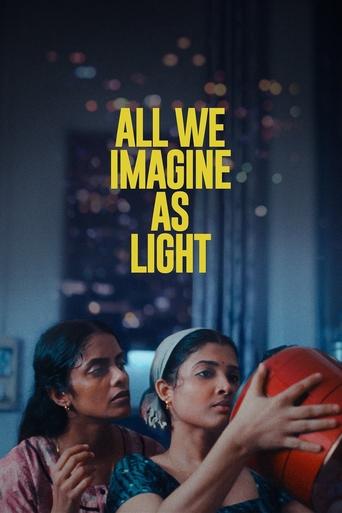
| Title: | All We Imagine as Light |
|---|---|
| Original Title: | പ്രഭയായ് നിനച്ചതെല്ലാം |
| Plot: | In Mumbai, Nurse Prabha's routine is troubled when she receives an unexpected gift from her estranged husband. Her younger roommate, Anu, tries in vain to find a spot in the city to be intimate with her boyfriend. A trip to a beach town allows them to find a space for their desires to manifest. |
| Cast: | Kani Kusruti, Divya Prabha, Chhaya Kadam, Hridhu Haroon, Azees Nedumangad, Tintumol Joseph |
| Director: | Payal Kapadia |
| Cinematography: | Ranabir Das |
| Editor: | Clément Pinteaux |
All We Imagine as Light
Tatsam Mukherjee
The Wire

As Light' Is a Sentient Ode to – and a Lament for – the Spirit of Mumbai
Payal Kapadia’s debut fiction feature follows the lives of three women who navigate the big city.
Payal Kapadia’s All We Imagine As Light (AWIAL) establishes its Mumbai DNA early on. A visibly-tired Anu (Divya Prabha), an upstart nurse in a city hospital, is jotting down details of a patient. Age? “24… oh no sorry, it’s 25,” a young woman says, holding on to her child. “Pfft!” reacts Anu, showcasing her mild annoyance for having to strike out what she’d written earlier.
All We Imagine as Light
Ishita Sengupta
(for OTT Play)
Independent Film Critic
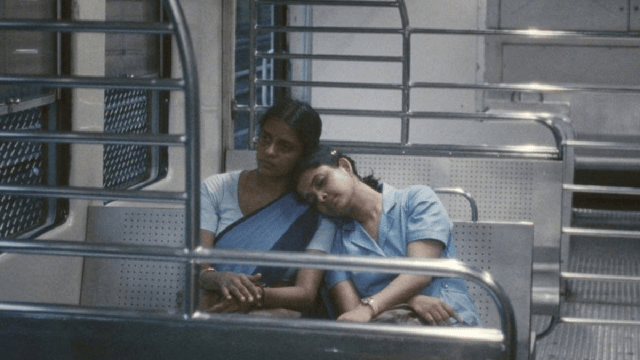
A Moving Ode To Mumbai & Sisterhood
Payal Kapadia's All We Imagine as Light is one of those life-altering gems that is transcendental and a moving memoir of mundane, transformative and a crushing reiteration of community sustenance.
Three women, monsoon and a severe city. If Payal Kapadia’s iridescent All We Imagine as Light was a novel, there would be dried flowers stuck between its pages. Since it is a film, the intangible feeling is imbued with visual tactility. It is present in the way Prabha (Kani Kusruti), a middle-aged woman, holds a totem of cold technology within the warmth of her embrace. It is embossed on the face of Parvaty (Chhaya Kadam), a woman in the middle of a crisis, as she listens to a fiery political speech about reclaiming what is hers. And it drips from the text messages a young Anu (Divya Prabha) sends to her lover: “I am sending you kisses through the clouds so that when it rains my kisses touch your lips.” Kapadia’s film is suffused with such ache that if you extend your hand you can touch it.
All We Imagine as Light
Keyur Seta
(for The Common Man Speaks)
Bollywood Hungama
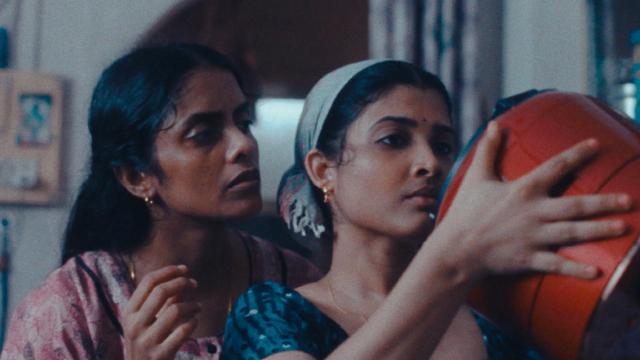
Poignant portrayal of life in a metro for the not-so-privileged
Mumbai has not only been one of the most featured cities in Indian films but it is also explored as a subject over the decades. Many a times, the dark underbelly of the city is brought to light. Filmmaker Payal Kapadia’s worldwide acclaimed feature film debut All We Imagine As Light (Malayalam along with some usage of Hindi and Marathi) also shows the bitter side of Mumbai. But it, for a change, doesn’t feature the criminal side of the city in any way.
All We Imagine as Light
Renuka Vyavahare
The Times of India
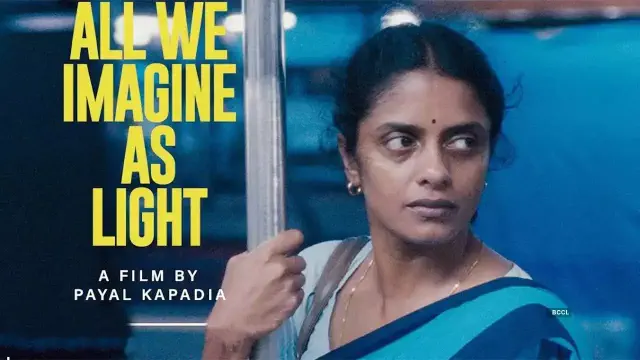
An enchanting ode to hope, desire & sisterhood
There’s a certain tenderness and ease to the flow in storytelling that feels cathartic.
Payal Kapadia’s enchanting ode to sisterhood and the glaring contrasts of Mumbai has a tranquil charm to it. There’s a certain tenderness and ease to the flow in storytelling that makes you see the city in a new light, even if you have been a Mumbaikar all your life. Watching Kapadia’s three protagonists setting themselves free from societal and psychological shackles to embrace their desires, gives you that warm fuzzy feeling.
All We Imagine as Light
Shubhra Gupta
The Indian Express

Payal Kapadia’s lyrical ode to working-class Mumbai and female friendship
The wonderful Kani Kusruti turns yearning into a full-time job, and just for her, this film which releases in India today, is worth every minute of your time.
A woman leans on a pole in her compartment, for support, for balance, swaying with the rhythm of the train. She looks exhausted, after a long day at work. We take in, like she does, the way the city looks at night, bars of refracted light and darkness dancing across her face. This image, which comes early in Payal Kapadia’s lyrical ode to working-class Mumbai and female friendship, becomes a marker of the themes the film explores, and it stays with you.
All We Imagine as Light
Rahul Desai
The Hollywood Reporter India

Payal Kapadia’s Sublime Love-Hate Letter To Mumbai
The migrant drama starring Kani Kusruti, Divya Prabha, Chhaya Kadam and others, reimagines the contours of the big-city film.
All We Imagine As Light opens like a non-fiction film about a city of grand fictions. We see a dark Mumbai — the factory of dreams — in which its survivors and victims imagine light. Invisible migrant voices play over a montage of traffic, streets, beaches, stations and hope. A pregnant housemaid jokes about being fed well by her employer. A veteran from Gujarat refuses to call it home because he’s afraid he might have to leave any moment. A dockyard worker recalls the fishy smells from his first night; he speaks like the stink has gone, but it’s his nose that adapted. A woman credits the place for making her forget a breakup. They all sound like stories from the “Spirit of Mumbai” handbook — it’s hard to tell their fate from their faith. The film seamlessly transitions from the generic to the specific by the end of this montage. The camera settles on one such story in motion: two Malayali nurses on the train back to their tiny apartment.
All We Imagine as Light
Upma Singh
Navbharat Times
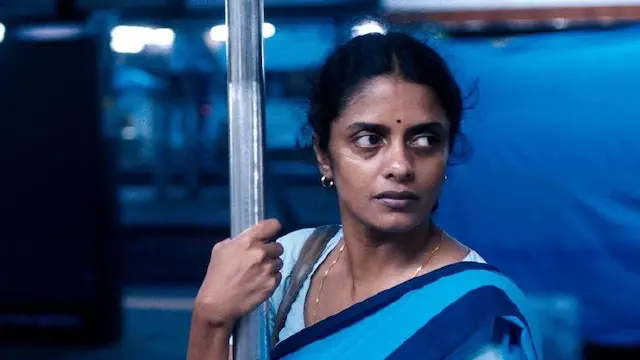
रंगीनियत से परे वाली स्याह मुंबई के नाम प्रेम गीत
बॉलीवुड की फिल्मों में मुंबई को हमेशा खूब रोमांटिसाइज किया गया है। मसलन, बड़ी-बड़ी इमारतें, बाहें खोले समंदर, चकाचौंध भरी जिंदगी, प्यार का अहसास दिलाती बारिश, लेकिन इस सारी चमक-दमक के बीच यहां बहुत से ऐसे लोग हैं, जो अपने हिस्से की रोशनी के लिए रोज संघर्ष करते हैं। जो यहां की तमाम भीड़ में भी अकेले हैं। ये वो हैं, जो रोज उठते हैं, काम पर जाते हैं और लौटकर आ जाते हैं। इनकी जिंदगी इस भागते शहर में भी ठहरी हुई है। पायल कपाड़िया की कान फिल्म फेस्टिवल में प्रतिष्ठित ‘ग्रां प्री अवॉर्ड’ जीतकर इतिहास रचने वाली फिल्म ‘ऑल वी इमेजिन एज लाइट’ रंगीनियत से परे वाली इसी स्याह मुंबई के नाम प्रेम गीत है।